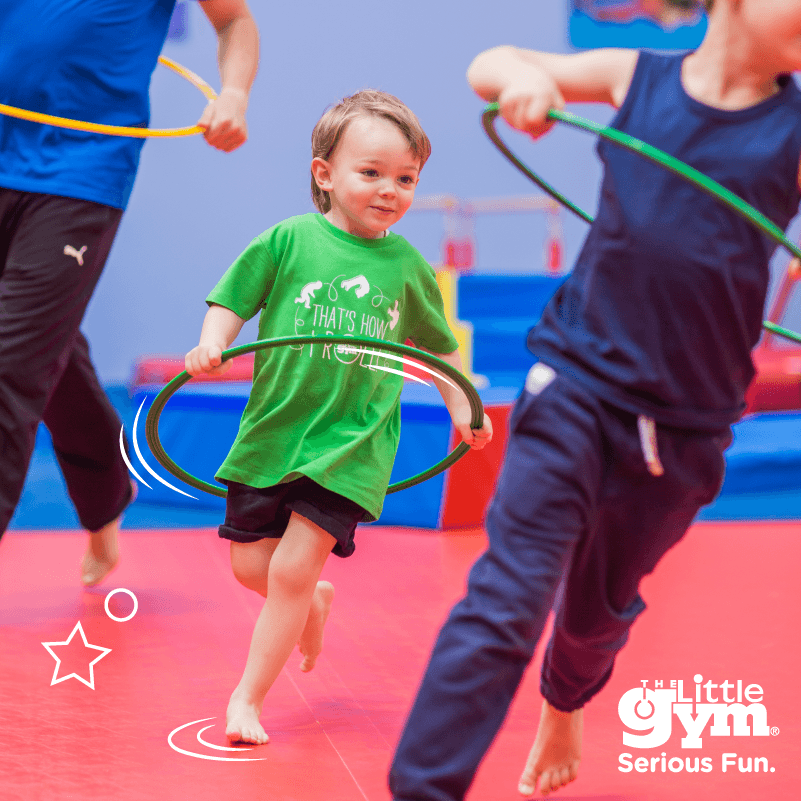<Back to news
22 Jun 2025
How Active Should Kids Be?
What the NHS Recommends—and Why It Matters

Children thrive when they’re active. Emotionally, physically, and cognitively. Regular movement boosts confidence, improves classroom performance, and reduces anxiety. And the NHS is clear—start young, make it vigorous, and include body-strengthening movement.
At The Little Gym Windsor, we live by this advice every day. And yes—gymnastics is one of the top recommended activities in the NHS guidelines! For even more growth for your child, choose Developmental Gymnastics.
Movement Builds More Than Muscles
Research shows that even before babies can crawl or walk, movement plays a vital role in brain and body development. Encouraging physical activity from the earliest stages supports long-term confidence, coordination, and cognitive growth.
The NHS recommends:
- Under 5s: At least 3 hours of physical activity per day
- Ages 5+: At least 60 minutes of moderate to vigorous activity daily
- 3 times per week: Activities like gymnastics to strengthen bones and muscles
Yes, gymnastics! It’s specifically highlighted by the NHS for its ability to support better general health, stronger bones, and improved self-esteem.
Gymnastics: A Powerhouse of Development
At The Little Gym Windsor, we know gymnastics is more than cartwheels and handstands. Learning how to do a handstand builds muscle and bone strength—but it also improves balance, coordination, and spatial awareness. These are critical foundation skills for all other sports and life in general.
Think about it: a child can’t kick a football if they can’t balance on one leg. Physical literacy comes first—and gymnastics is a fantastic, fun way to build it.
Developmental Gymnastics vs Traditional Gymnastics
So what’s the difference between traditional gymnastics and developmental gymnastics, like we offer at The Little Gym?
Traditional gymnastics focuses on competitive skills and routines—great for future athletes, but often pressure-filled and not right for every child.
Developmental gymnastics, on the other hand, is designed to build the whole child—physically, emotionally, socially, and cognitively—through age-appropriate challenges in a non-competitive, nurturing environment. It’s about confidence, coordination, and courage—not medals.
This approach helps children feel safe to take physical and emotional risks, try new things, and learn to love movement for life.
Keep It Fun and Get Creative
The key to keeping kids moving—especially in winter—is making it fun. Riding bikes, swimming, and running around in The Little Gym doesn’t feel like exercise to them… it feels like play.
When the weather’s dreary, don’t be discouraged. Race to the park, skip through the frosty grass, or splash in puddles on the way to the pool. Join in with your child’s play—even if it means pretending to be a puppy chasing a ball around the park. One of our coaches has even done that (with a clean ball!) to get her little ones giggling and moving. It’s all great bonding—and excellent exercise.
Let’s Keep Kids Moving—Together
No matter the season, activity is essential for your child’s development and well-being. Use creativity, humour, and the support of clubs like The Little Gym Windsor to keep your kids active, strong, and smiling.
Want to learn more? Call us on 01753 968 488 or email windsor@thelittlegym.co.uk. Let’s keep moving, learning, and growing together.
Author:
Matina Macintyre
Co-Owner & Lead Teacher
The Little Gyms of Windsor & Handy Cross